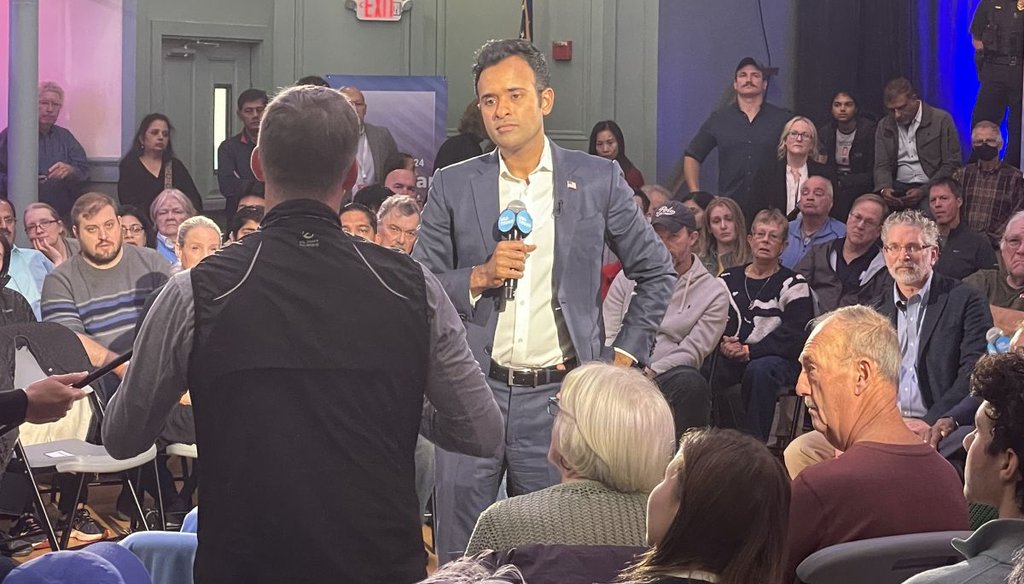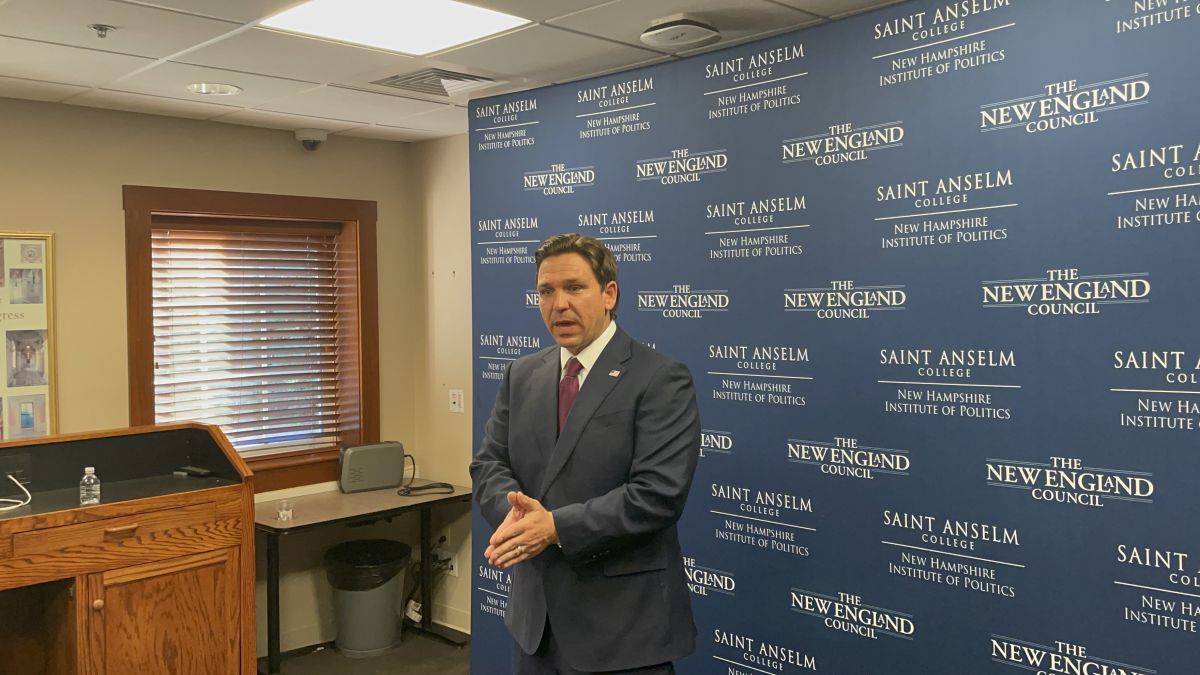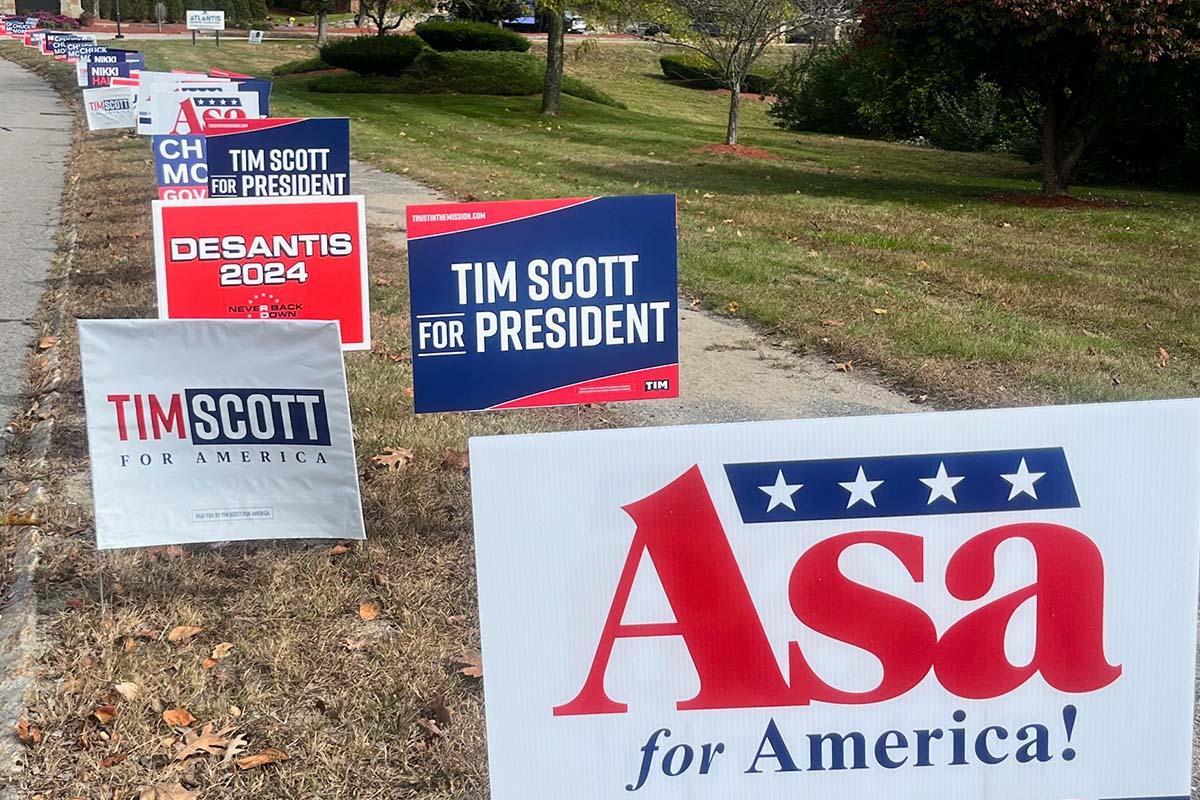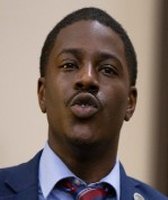Stand up for the facts!
Our only agenda is to publish the truth so you can be an informed participant in democracy.
We need your help.
I would like to contribute

Republican presidential candidate Vivek Ramaswamy listens to a questioner at a town hall in Exeter, N.H., on Oct. 14, 2023. (Louis Jacobson/PolitiFact)
EXETER, N.H. — At a town hall in this picturesque New England village, Republican presidential candidate Vivek Ramaswamy came face-to-face with the spirit of the New Hampshire primary process. Ramaswamy was about halfway through his hourlong session Oct. 14 when a woman stood up and delivered a two-minute monologue.
She said, "Just a few years ago, we all saw firsthand the disastrous results when a ruthless capitalist, a scam artist, a showman and a liar with no public service experience became the president of the United States, and yet we are here again. My fellow New Hampshire residents are being manipulated by showmen and Trump wannabes to win our votes."
She called Ramaswamy — an entrepreneur without experience in electoral politics — "not qualified to run" for president, or to even be principal at her children’s school.
"Spewing nonsensical, fast-talking, empty words interspersed with name-dropping Thomas Jefferson and George Washington should not be misconstrued as ‘knowledgeable,’" she said.
When moderator Phillip Bailey, USA Today’s national political correspondent, prodded her to ask a question, the audience member ended her remarks by asking Ramaswamy, "Please, your thoughts."
Unfazed, Ramaswamy thanked the woman and said, "Hard questions are welcome." He explained why he believes an outsider is needed to break the stranglehold of money and corporate interests in politics.
Ramaswamy’s exchange with the audience member — followed by another attendee’s pointed question about Ramaswamy’s stance on Palestinian rights — illustrates how the up-close-and-personal New Hampshire primary process persists, even in an age of TV attack ads and social media.
Yes, several of the candidates we saw at the New Hampshire Republican Party’s First in the Nation Summit in Nashua and in other events in Manchester and Exeter paid homage to the venerated role of the feisty, inquisitive New Hampshire voter.
Yet, after a couple days on the ground in New Hampshire — part of PolitiFact’s effort to fact-check the GOP primary candidates in partnership with WMUR-TV — there are also signs that something is different this year. Maybe even amiss.
Former President Donald Trump, who is lapping the field in voter support, has been absent from events that host all Republican candidates. Following an Oct. 13 address at the "Politics & Eggs" speaker series at St. Anselm College in Manchester, Florida Gov. Ron DeSantis told reporters he would be "lighting up the town halls and the house parties in New Hampshire a lot of the next 100 days" because voters "resent being taken for granted."
"You have to earn this," DeSantis said. "It's something that they expect. They want to be able to kick the tires" on candidates.
DeSantis also told reporters that some candidates feel "entitled" to not show up on the campaign trail in New Hampshire, and that "is going to burn them."
Republican presidential candidate Ron DeSantis meets with reporters after speaking Oct. 13, 2023, at the "Politics & Eggs" series in Manchester, N.H. (Louis Jacobson/PolitiFact)
Although Trump has visited New Hampshire — speaking at an Oct. 9 rally in Wolfeboro, for instance — he skipped the summit in Nashua, as he has all of the national primary debates. And political observers in New Hampshire agree that the differences between this year and years past are palpable.
The New Hampshire primary season "feels different — times have changed," Jane Lane, a secretary for the New Hampshire Republican State Committee who has been involved in the state’s primaries since 1980, told PolitiFact during a break in the summit.
Dante Scala, a University of New Hampshire political scientist, said, "Candidates still interact with voters at town meetings — there’s a fairly steady stream of them coming in and out. What’s changed is what’s happened between those visits."
Scala said grassroots movements on behalf of candidates — door-knocking, leafleting, house parties — have waned. Efforts to line up the backing of town and county party chairs "feels more like an anachronism than it used to," Scala said.
Part of the reason, said Andrew Smith, another University of New Hampshire political scientist, is that "most people now get their campaign news from national news sources."
But Trump’s absence has exacerbated the shift away from ground-level politicking, observers say.
Having a front-runner so far ahead, and so infrequently in the state, "dampens things" for the rest of the field, Scala said: "The whole cycle feels like there are two incumbents — President Joe Biden and Trump — running, not one."
Republican voter Dave DeWitt, 77, of Dublin, New Hampshire, about 40 miles northwest of the Nashua summit, told PolitiFact that this primary is "definitely different than before."
"They’re all here — they’ve all been around. Well, except for one," said DeWitt, who wore a "DeSantis 2024" baseball cap and told us he voted for Trump twice but isn’t inclined to in 2024.
Trump’s absence led Chris Galdieri, a St. Anselm College political scientist, to use a term Trump has historically lobbed against his rivals to describe the New Hampshire primary season: "low-energy."
"Candidates show up, leave, and take their campaign with them," Galdieri said. "I’m hearing from other political science professors who want to bring their students into the political process as volunteers that they can’t find anyone to work with at candidate offices."
Despite a moderate streak among New Hampshire’s Republican electorate, Trump’s strong support within the Republican base has led most of his rivals to treat him gingerly on the trail here.
"The candidates are really reluctant to criticize Trump directly, and are certainly not doing it in moral terms," Galdieri said.
During our visit, we saw candidates criticize Trump’s spending, but they often lumped his policies in with those of Democratic presidents Barack Obama and Biden rather than singling him out.
Lawn signs for Republican presidential candidates on Oct. 14, 2023, outside the First in the Nation Leadership Summit in Nashua, N.H. (Samantha Putterman/PolitiFact)
A more direct approach boomeranged on Christie. When he spoke at the summit in Nashua, Christie called out Trump for promoting the false narrative that the 2020 election was rigged. It won him the only boos we heard for any candidate during our visit.
Another well-worn tactic — a lower-profile candidate essentially moving to New Hampshire for a few months to try to generate grassroots support — appears to be a nonstarter this year. Galdieri is especially surprised that Christie, who is the field’s most aggressively anti-Trump candidate and isn’t contesting the earlier Iowa caucuses, hasn’t gone that route.
"He seems to come up every couple weeks," Galdieri said. "That’s it."
Scala said the more typical dynamic — nationwide attention boosting local performance — shows this year with former South Carolina Gov. Nikki Haley. She’s rising in the polls in New Hampshire less because of ground-level interactions with voters, but rather because she attracted new attention after the two nationally televised Republican debates.
Ultimately, experts said, the New Hampshire primary will likely remain important in the political process. But measured by delegates that determine the nomination, "the number here is insignificant."
That means the primary’s primacy depends on continued in-person participation, the University of New Hampshire’s Smith said.
"It’s only important if the candidates show up," he said. "If they don’t bother to come, it becomes pretty meaningless."
RELATED: Fact-checking Day 1 of the New Hampshire GOP summit
RELATED: Day 2 of the New Hampshire GOP summit, fact-checked
RELATED: Nikki Haley mixes red meat with more moderate tone in Exeter, New Hampshire, town hall
RELATED: Fact-checking Ron DeSantis in New Hampshire on education, economy and drugs
Our Sources
Interviews by PolitiFact with voters and experts in Manchester, Nashua, and Exeter, New Hampshire, Oct. 12-15, 2023









































